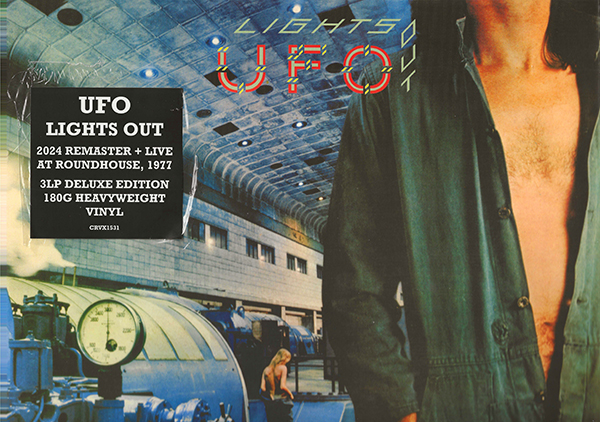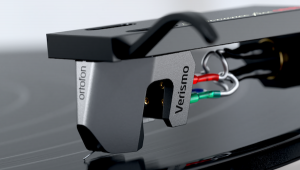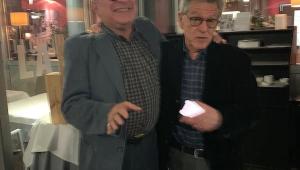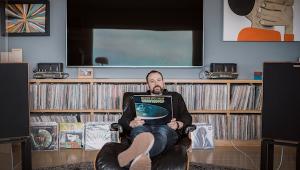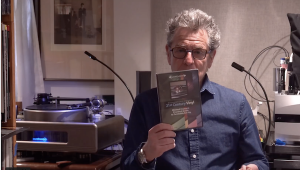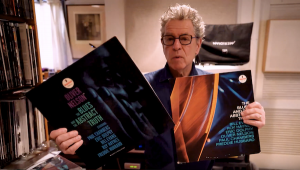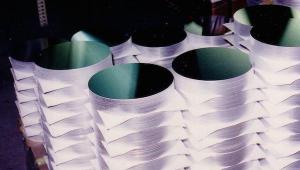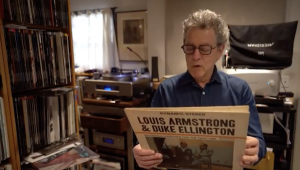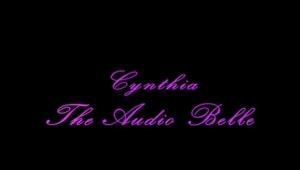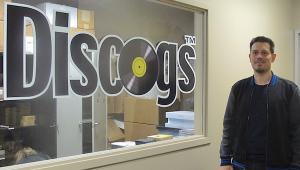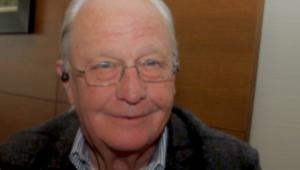Phil Mogg Shines His Misty Green and Blue Light on the Newly Expanded 180g 3LP Deluxe Edition of UFO’s 1977 Hard Rock Classic, Lights Out
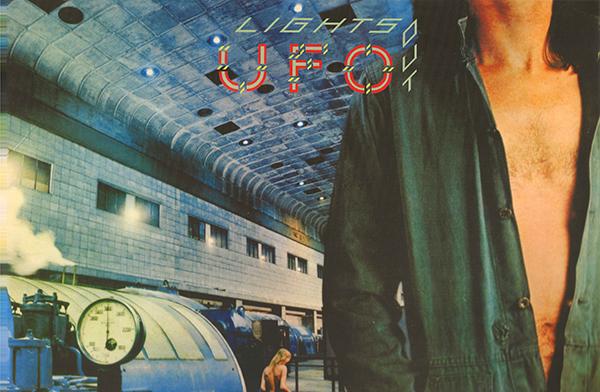
Staying power. That’s UFO in a nutshell — the pioneering British hard rock band that’s been flying high on an international scale ever since their formation in London in 1968. Best known for FM favorites like “Too Hot to Handle,” “Lights Out,” “Only You Can Rock Me,” and “Doctor Doctor,” the band soldiered on throughout occasional lineup changes over the decades, with the one constant on all UFO releases being lead singer Phil Mogg.
Sadly, longtime UFO keyboardist Paul Raymond passed away in 2019 and co-founding bassist Pete Way passed away in 2020, and the “Last Orders” 50th anniversary tour in 2019 (along with some post-pandemic dates in 2022) appears to have put a lid on the band’s active status for the time being. Even so, in 2020, Chrysalis, UFO’s label during their 1970s heyday, began reissuing the band’s core albums on 180g vinyl (sometimes on clear vinyl, sometimes black) in multidisc Deluxe Edition packages that include scores of bonus material, unreleased live recordings, extensive liner notes, large-scale photos of original tape boxes on the inner sleeves, and lavish gatefold packaging all in tow — exactly how deluxe reissues should be handled, in my opinion.
Mogg very much agrees with that assessment. “Mainly, it was Chrysalis deciding to repackage them,” he concurs, “and they’ve not done it in a tacky way. They’ve done some really nice stuff, with some really nice vinyl colors. Yeah, they’ve done a great job. How do I put it? I’m eternally thankful.” Then he adds, with a sly chuckle, “particularly as I lost my old originals, it’s quite nice to have new ones.”
Mogg demurs from playing any of his own UFO reissues on a “dodgy turntable I’m scared to put vinyl on,” so he Instead set his sights on acquiring a new Sony Bluetooth table to take care of his LP business instead. Just like those dueling inner monologues many of us have when it comes to rationalizing getting new gear, Mogg admits that he also “had a bit there where I was going, ‘Go on, go on — buy it. Buy it!’”
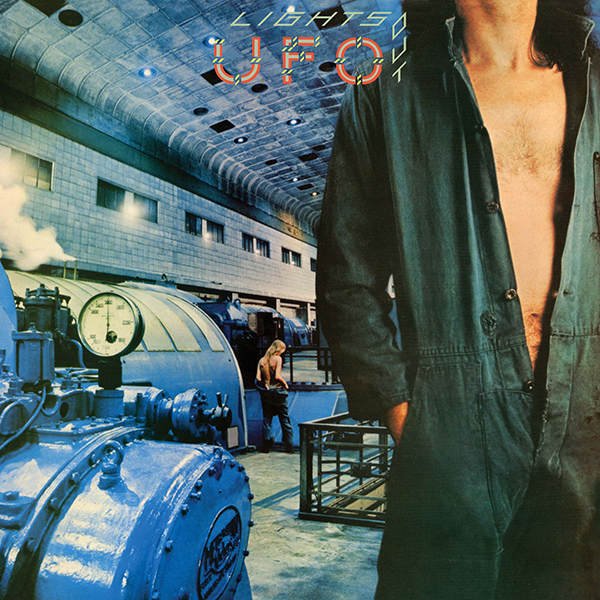
Chrysalis’ most recent UFO reissue is the quite formidable 180g 3LP set for the band’s most popular LP, May 1977’s Lights Out, which was released on February 1, 2024. After vacuum-cleaning both the new LP set and my well-loved 1977 Chrysalis original on my Record Doctor X VRCM , it was no contest. For example, the soaring Queen-like guitar intro, the resonance of the early-track gong hit, the clarity of the cymbal accompaniment to the noodling keyboard intro, the electric/acoustic guitar blending, and string treatments throughout the album’s final, linchpin track, “Love to Love,” made the version of that song on my original 1977 LP seem quite dull in comparison. Other moments, like the wide-panned guitar-riff tradeoffs in “Too Hot to Handle,” the clean piano break in “Just Another Suicide,” and the layered vocal harmonies in their cover of Love’s “Alone Again Or” also made the 2024 LP a winner in my listening book. Plus, the 13 of-era live tracks recorded at The Roundhouse in London on April 2, 1977, are indeed welcome spins on their own, most especially “Gettin’ Ready,” “Out in the Street,” and “C’Mon Everybody.” (More on that latter, audience-rousing cover of an absolute stone-cold Eddie Cochran classic later.)
The stats are these, as confirmed directly, and exclusively, with me via UFO’s management and marketing teams. Lights Out was newly remastered from the original tape transfers by engineer Andy Pearce. Chrysalis confirmed that they indeed still have the original tapes in their possession, and Pearce transferred them digitally “at the highest quality.” The live Roundhouse material was newly mixed by Richard Whittaker at The Bridge in September 2023 from the original 24-track and prepared for mastering, the latter of which was done by Pearce along with Matt Wortham at Interstellar Mastering. The lacquers were cut by Pearce, and the vinyl itself was pressed at GZ in the Czech Republic. Finally, the SRP for this 3LP set is a quite reasonable $45.99. (Incidentally, those of you who remain skittish about GZ pressings should refer back to my listening notes above.)
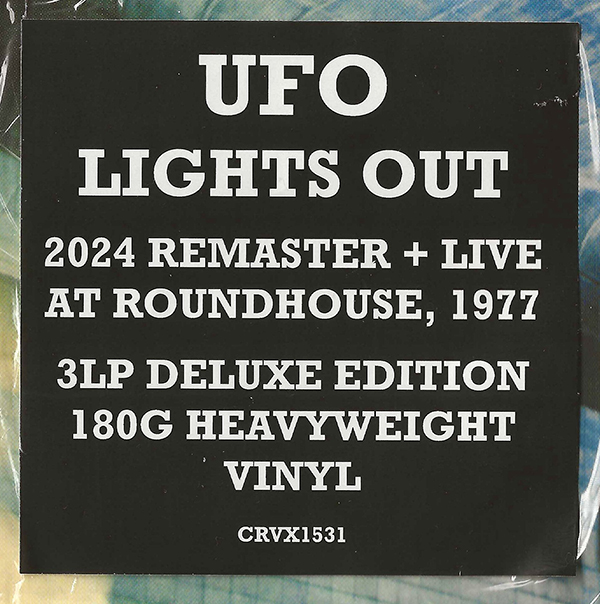
For his part, Mogg is looking forward to whatever Chrysalis releases next from the UFO catalog on vinyl, though he is not yet personally aware of what’s on their to-do list. (Since the label has been going chronologically through the meat of UFO’s 1970s studio catalog, my vote is for June 1978’s Obsession to be next on deck.) The vocalist adds that he recently completed a solo album comprising of 11 tracks recorded at a studio in Essex. The album is tentatively dubbed Mogg’s Motel, and it includes contributions from his latter-era UFO bandmate, keyboardist Neil Carter, along with members of fellow British hard-rockers Voodoo Six.
Mogg, who suffered a heart attack in 2022, just wants to keep on keeping on. “What’s the way that saying goes? ‘As long as it’s fun, I’ll do it,’” he concludes. “When it stops being fun, it’s time to think about retire — about not doing it anymore. It’s intentionally a rock band, and it should be fun. That was always the general attitude with the band.” (Hmm, not too hot to handle gettin’ ready, after all. . .)
In a recent phone interview across the Pond, Mogg, 76, and I discussed how the band changed their approach in the studio for the Lights Out recording sessions, why he’s pleased with the way Chrysalis is handling the UFO vinyl reissue series, and why his creative sensibilities meshed so well with UFO’s album-art design team at Hipgnosis. Help me now to feel it / I just can’t conceal it. . .
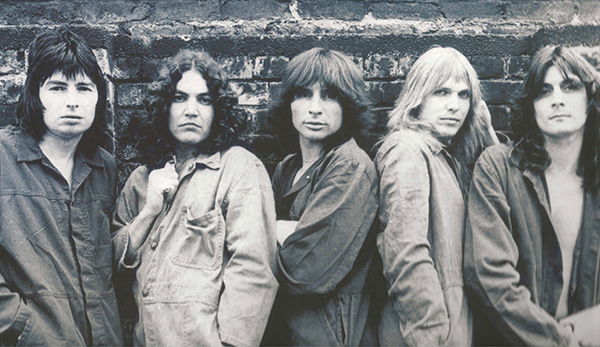
Mike Mettler: Lights Out is the first UFO record where you guys worked with Ron Nevison as a producer. Do you remember what was different in the studio when you were working with him for this album?
Phil Mogg: Well, it was a complete change from Leo [Lyons, the Ten Years After bassist who produced UFO’s previous three studio albums]. We had built up to the point where we fancied we needed a change, and we’d been snooping around who did what on what record — as you do — and his name popped up a lot. He was on a lot of records, either engineering or producing, and we asked Chrysalis if they could get Ron, and he said, “Yeah! Okay. Glad to.” [Prior to Lights Out, among other credits, Nevison had engineered The Who’s 1973 masterpiece Quadrophenia and Bad Company’s 1974 self-titled debut, and he also co-produced Thin Lizzy’s Nightlife LP in 1974.]
So, we met up and got some sort of working relationship with Ron, which was good. It was fun. We laughed a lot — but it was not always at the same time. (chuckles) We used AIR Studios on Oxford Street [in London, Sir George Martin’s first studio facility], which had just opened, which was really nice.
Mettler: Did working with Ron change anything you personally did in the studio? Like, did you notice anything different while you were singing?
Mogg: Well, I think Ron changed the tunes around — the ones we brought in. And mainly on the mike, I did a close-on vocal, but then you’re gonna step back a bit when you’re gonna knock it out. Generally, there’s not a lot of technique going on. (chuckles) No, what I was gonna say is, it’s something you feel, isn’t it?
A lot of that stuff was on one 24-track back then, wasn’t it? Oh God, if you made a cock-up — oh, dear! (chuckles) Yeah, if you’ve ever seen the engineer cutting a 24-track, just to cut a bit out — it’s quite nerve-wracking! (chuckles heartily)
We also got to do Love’s “Alone Again Or” [Side B, Track 2], which has always been a bit of a favorite. [It was originally on Love’s November 1967 LP on Elektra, Forever Changes.] Yeah, it’s a cool song — and Love were a very cool band. Never done it live, actually. I think we tried it once. Something about the harmonies — but I know it’s worth a shot, maybe, as an off-the-wall number.
And, oh, what was his name? Alan McMillan, the orchestration guy — he was really, really good, and what he did didn’t detract in any way from the tunes. We got a lot of freedom, and there were a lot of ideas coming around. Ron had a lot of sound ideas, and it was all great.
Mettler: Did Ron bring the idea of using Alan for the strings and orchestration to the band? Did you have to warm up to the idea?
Mogg: That was from Ron. We’d spoken about it. As far as orchestrations go, I don’t mind if it’s like dark, deep cellos — anything towards that direction suited us fine.
Mettler: Certainly, having “Love to Love” to end the record [Side B, Track 4] is a pretty powerful statement. Did you always have that one in the sequencing that way?
Mogg: No. Actually, that started off as one of Michael [Schenker]’s little [guitar] solos — which is still in the tune — but then we’ve built the tune around the solo. By the time we got to knocking around with it in rehearsal, it turned into seven minutes long! Or, depending on the lead guitarist, it could be half an hour. (both laugh) You could go on holiday and come back, and he’d still be playing. (more laughter) No, I’m joking.
Mettler: Did you have a sense that “Love to Love” would become so impactful? That was a major FM hit for UFO, and people really love that song to this day. Did you have any idea it would have such an effect on listeners like that?
Mettler: I love the way the Lights Out side breaks go, where you’ve got the four-and-four split. Side A has that perfect bookend of “Too Hot to Handle” [Track 1], and then “Lights Out” ends it [Track 4]. Sequencing-wise, did you guys know early on what it was going to be? Did you argue about it, or did you just have a sense of like, “This is how the record has to flow”?
Mettler: I get what you’re saying. Now that Chrysalis is putting UFO Deluxe Edition LP packages out essentially every year at this point, do you feel like it’s reconnecting people with the music, exposing new audiences to your catalog, or is it a little bit of both?
Mettler: I’m always doing that with those CD booklets too — either with a magnifying glass or by pinching the camera screen on my phone wider to read them! (chuckles) What I like about the artwork for UFO records of that 1970s time period is that you guys worked with Hipgnosis a lot, so they’re just such great concepts to start with. Tell me how you got hooked up with them. [Hipgnosis, an art design group co-founded by Storm Thorgerson and Aubrey “Po” Powell in London, designed many famous albums covers by the likes of Pink Floyd, Led Zeppelin, Yes, Genesis, and scores of other notable artists.]
Mettler: Yeah, it’s a classic UFO fake-out kind of cover, for sure. [According to Powell’s book about Hipgnosis, Vinyl. Cover. Album. Art, the Phenomenon cover is a picture of a couple in the act of “faking a photo of a UFO” by way of the husband, who’s seen looking up at the sky, actually having thrown a hubcap in the air.] For the Lights Out cover, was it the kind of thing where you’d give them the title, and then they’d work off of that? How did it come about?
And I don’t know what on earth Michael [Schenker]’s doing taking his clothes off. [Schenker has his naked torso turned partially away from the camera in the middle of the cover shot.] And I’ve got no hairs on my chest, which is really odd. Blimey! (chuckles) No, it’s a great cover. [Mogg is in the foreground on the rightmost side of the front cover, wearing a stylish of-era jumper, and no shirt underneath.]
Mettler: Agreed — it really is a great cover. The other thing that’s cool to me on that cover is the band logo is different. Before Lights Out, there was that outlined, pink-hued UFO logo on [June 1975’s] Force It and [May 1976’s] No Heavy Petting. I like how, on Lights Out, the logo evolved to being comprised of those circular, double letters connected by a series of small railroad-sign ties, or whatever you want to call them. It’s got a different feel, but it fits the whole package, it’s a definite change.
Mettler: And then we get [June 1978’s] Obsession, with all the cool, weird stuff on everybody’s eyes, and elsewhere. That’s another pretty striking cover, right there.
Mettler: Hipgnosis hardly ever went wrong with their cover designs, that’s for sure. Now, let’s talk about the live material on the two bonus LPs in the Lights Out package, which came from that great performance of yours at the Roundhouse in London in ’77 [specifically, on April 2, 1977]. At the end of “Lights Out” [Side C, Track 1], you say to the audience, “Well, it’s really good to play where you live for a change.” Do you remember that show very well?
Mettler: Didn’t Pink Floyd play there back in the day? [They did, numerous times between 1966-71.]
Mettler: The last song on the third disc is when you guys do a nice eight-minute run on “C’Mon Everybody” (Side F, Track 2), and that’s also where you get the audience to keep singing the title phrase over and over with you in call-and-response style. That’s a great thing to have on there.
Mettler: Oh, wow — isn’t that something? Did that version of “C’Mon Everybody” evolve like that organically when you guys first started covering it, and then it just turned into a good audience-participation thing? It’s really powerful in the way that it comes across here.
Mettler: Yeah, yeah. I think it was originally on [July 1970’s] UFO 1, if I remember correctly — the very first record. [“C’Mon Everybody” is Track 3 on Side 1 of UFO 1, which was released on Beacon in the UK, Decca in Germany, and Rare Earth in the United States.]
Mettler: Fair enough — for now. (chuckles) Well, we’re gonna wrap things up here with a futuristic question, if you don’t mind. I’m actually gonna throw us 50 years into the future now, since we’ve mostly been looking back today. We’re now gonna look ahead to the year 2074, and, as I usually put it, unless there’s some weird science going on, probably you and I are not physically on the planet at that time. (Mogg chuckles) However people listen to music in the future, and they type in “Phil Mogg” or “UFO” into a listening device, what kind of listening experience do you want that future listener to get out of your music?
UFO
Side A
Side B
LIVE AT ROUNDHOUSE, LONDON, 2ND APRIL 1977
Side C
Side D
Side E
Side F
Mogg: No, I don’t think so. I mean, we all loved it and liked it ourselves, but it’s always the way — you just hope that someone else is gonna like it too. But we didn’t have any guarantees that it was gonna be popular — not at that stage anyway. But 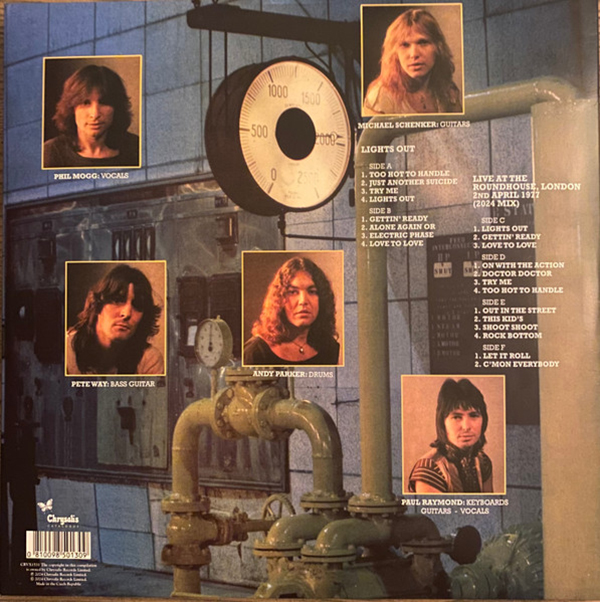
Mogg: No, I think that it went in a raffle, and that was the one [running order] that came out the best — or the one that suited it the best. Yeah, it was a bit like a raffle. Especially if you’ve been on top of it for quite a while, you lose a little bit of what it actually is all about. So, yeah, raffles are good.
Mogg: Both. I have to say, I think the vinyl thing is great, because you get (affects lower vocal tone) that cover. You get to engage with it, and while you’re playing it, you can fondle the packaging (chuckles) and look at the pictures and stuff, whereas you can’t do that with a CD because it’s just not got the same feel. I have to get my magnifying glass out to look at those CDs. (both laugh)
Mogg: They did some work for Chrysalis earlier on, and Hipgnosis, they were really starting to cook at that point — and of what they were producing then, there wasn’t a bad one amongst them. They were hot. And, fortunately, we got in with them. It was suggested, “How about you get Hipgnosis to do a cover? We’ll go up and meet them and have a chat, and then they’ll decide what to put on it, and what they’re going to use.” (chuckles) Nine times out of ten, most everything they pulled out of the bag was a real cool cover. The pitching the hubcap one, [May 1974’s] Phenomenon — I really liked that one they did for us. They came out with some great stuff, and they were really a Fun couple of folks to work with.
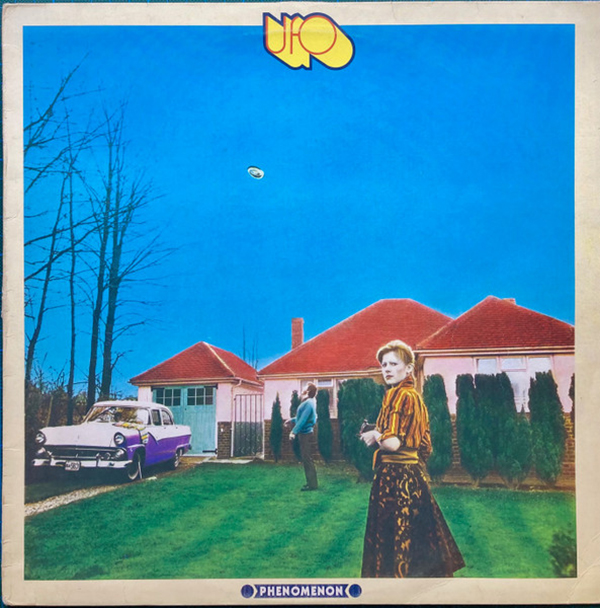
Mogg: It was ’round about that period that they were doing the [Pink] Floyd one with the pig [January 1977’s Animals], and the pictures for Lights Out are from the inside of that building [they were taken in the Turbine Room in Battersea Power Station, in London]. I’m not sure whether they had a few spare pictures and thought, “Oi! We’ll use that.” (MM laughs) We happen to have all that on Lights Out, but they came up with that cover. [According to Powell, Mogg “always came up with a title we could work to,” and Lights Out “conjures up nefarious deeds done in the dark.”]
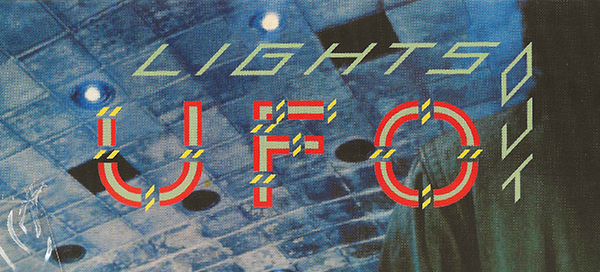
Mogg: Yeah, actually, it all changed then — the whole she-bob.
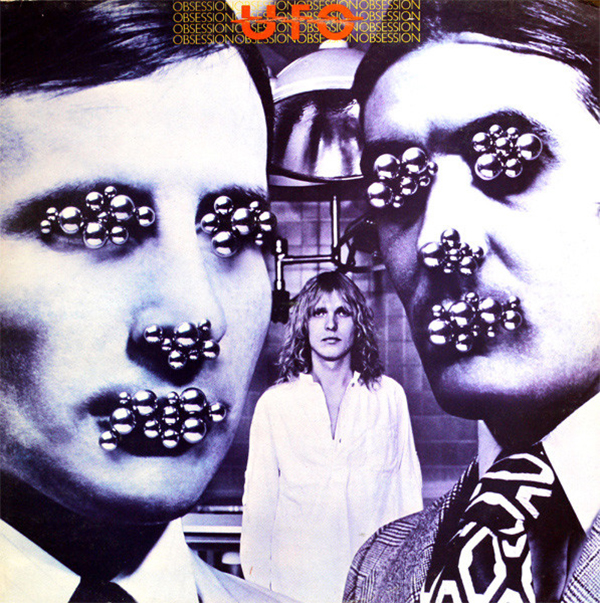
Mogg: That was, yeah. That was — well, I’m not sure whether they were doing an advert for ball bearings, by putting them on our eyes. (MM laughs) There’s something to be said about all that. We got another crazy idea from Hipgnosis, and we went with it. [Powell: “Hear no evil, speak no evil, see no evil — and a Hipgnosis addition to the expression: smell no evil.”]
Mogg: Yeah, I do. The Roundhouse was always a memorable show, mainly because it was down the road. And if you were stuck, you could actually walk home. (chuckles) It’s nice to play your hometown, really, and the Roundhouse was always a great gig. Yeah, it had some of the bands we used to go and see, so it was always a bit of a privilege to play there.
Mogg: Oh yeah, Pink Floyd played there. And The Who, Small Faces, The Crazy World of Arthur Brown, Jimi Hendrix. Yeah, they all played there.
Mogg: Oh God, yeah — yeah! Eddie Cochran. Funny enough — well, not funny enough, really, but I went past where he had his road accident. I was having my car fixed way up north, and I went past the memorial at the side of the road they have there for him. It’s got “three steps to heaven.” [Cochran passed away at age 21 after a horrific car accident in Bath, Somerset, England on April 17, 1960.]
Mogg: That was a straight-out audience pleaser — a song for the audience. We had it on the very first one of those UFO albums that came out donkeys years ago. We had a hit with it in Japan, and we went over to Japan on the back of that. So it’s always been part of the act, then.
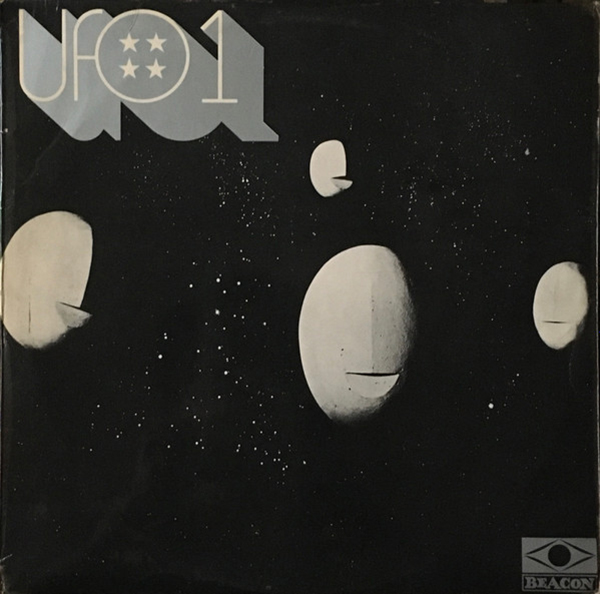
Mogg: Ahhh, yeah, I believe you’re right. That was a long, long time ago. I don’t know if we’ll reissue that one. Maybe we’ll let sleeping dogs lie. (chuckles)
Mogg: I’d like it to be like they’re listening to Frank Sinatra or Al Jolson (laughs heartily) — because it’ll be that old. It’ll be in black and white, almost with cobwebs on. Oh dear! (chuckles) But, no, I think those things — the music — will last. It’s just us that don’t.
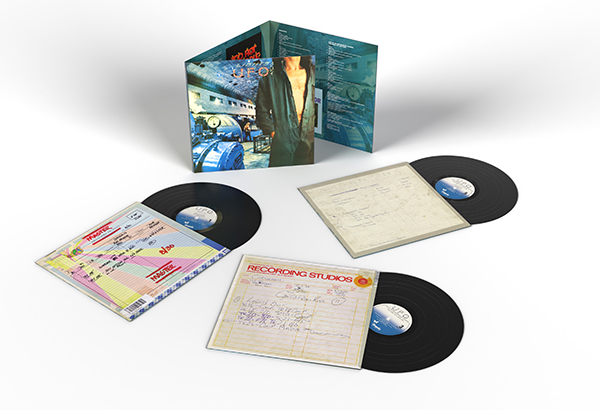
LIGHTS OUT – DELUXE EDITION
180g 3LP (Chrysalis)
1. Too Hot To Handle
2. Just Another Suicide
3. Try Me
4. Lights Out
1. Gettin’ Ready
2. Alone Again Or
3. Electric Phase
4. Love To Love
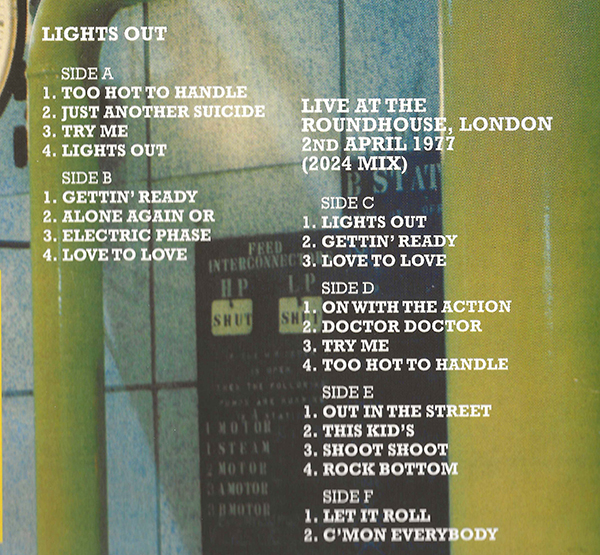
1. Lights Out
2. Gettin’ Ready
3. Love To Love
1. On With The Action
2. Doctor Doctor
3. Try Me
4. Too Hot To Handle
1. Out In The Street
2. This Kid’s
3. Shoot Shoot
4. Rock Bottom
1. Let It Roll
2. C’mon Everybody
